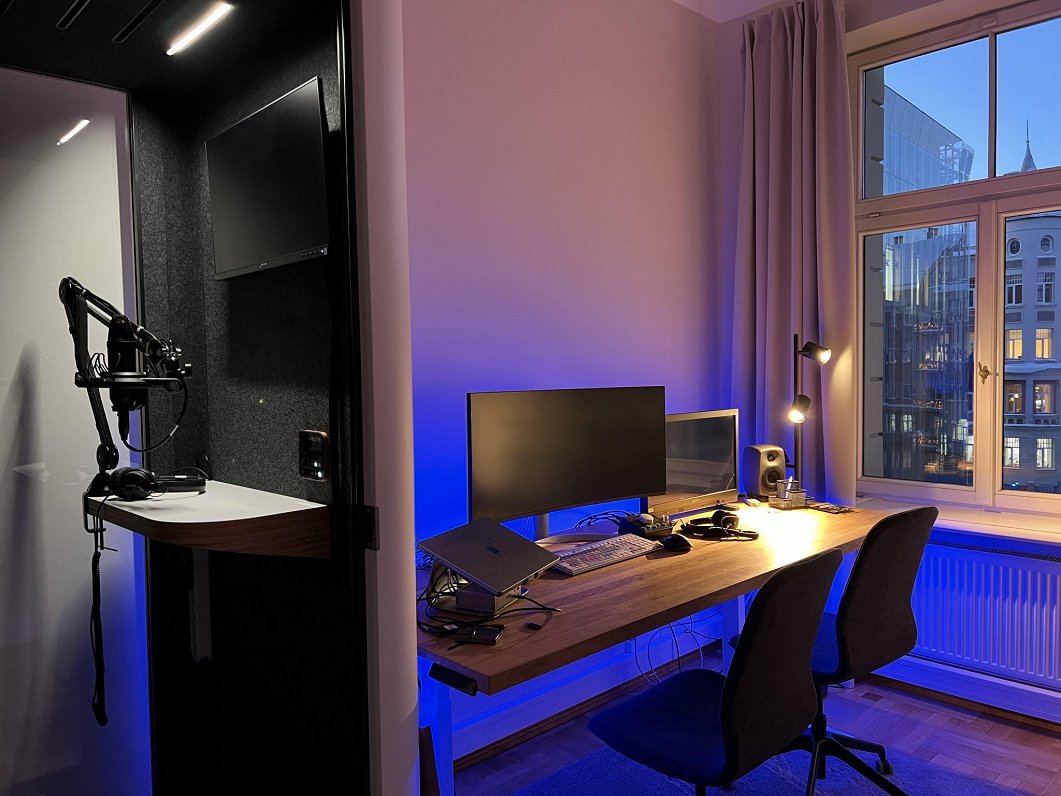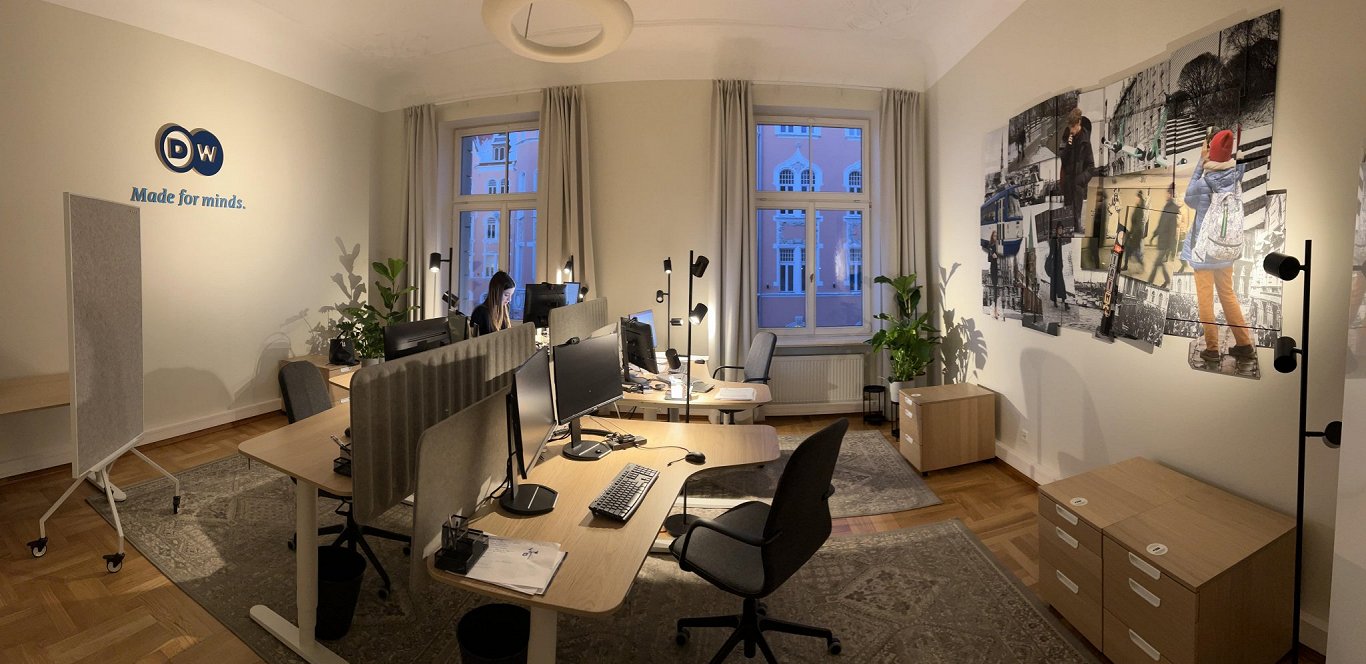Following the closure of its Moscow bureau and the withdrawal of its staff's accreditation by the Russian government, German international broadcaster Deutsche Welle (DW) chose to relocate its Moscow-based broadcast operations to Latvia.
After several month of setting up the technical and organizational infrastructure in Rīga, the official opening of the new DW bureau took place on December 7 during a visit of DW Director General Peter Limbourg.
“We are very happy that we ended up here with our studio. It's important that we don't just abandon our efforts to explain Russia“, Limbourg told LSM on the sidelines of the evening event that was also attended by numerous media professionals, parliamentarians and members of the diplomatic corps including
the German ambassador.
"I am very grateful that we were able to open this office in Riga very easily and also received a lot of support from the authorities. Everything went smoothly,“ said Limbourg.
The DW staff was welcomed at the reception by Rīga Mayor Mārtiņš Staķis who congratulated the team on its successful relocation.

"We are so proud to have you here in Rīga. It is crucial to have reliable information these days. Information from professional journalists, information from media you can trust. From media with values and history - and I think that is what Deutsche Welle is about,“ Staķis said.
DW is a German state-owned 24-hour news channel funded by the federal tax budget. The broadcaster is organized independently of the German state and the government has no influence on the programming.
Relocating to Riga after closure of Moscow bureau
The Russian government ordered the closure of DW's Moscow bureau and revoked the accreditation of DW journalists in the country in early February. In addition to blocking access to the company's website from within Russia, the German broadcaster was also later classified as a 'foreign agent'.
"We have been brought here because of the Russian war in Ukraine and we were some of the first victims. Before the 24 February invasion, we got kicked out of Russia, we lost our licenses, we had to close the office and our colleagues had to leave“, Limbourg recounted the events at the beginning of the year.
Russia's move against DW sparked international criticism and has been widely seen as retaliation for a broadcasting ban by German media regulators against the German-language television channel of Russian state media outlet RT.
But whereas DW had a licence to broadcast in Russia, RT did not have a licence to broadcast in Germany and also never applied for one.
Limbourg voiced the hope for DW to be able to go back to Russia one day but does not expect reporting to resume directly from Moscow in the near future.

"When I look at the situation, it won't happen anytime soon," he said. By opening an exile office in Latvia, the broadcaster wants now to set a statement from a country and a region in which a large number of people of Russian origin live.
“We want to integrate well in Rīga. We don't see ourselves as helicopter journalists that fly in and wait here for the storm to pass. Rather, we want to take a lot of Latvian culture and local life with us while we're here," emphasized Limbourg. “We are planning here for the next few years, not for the next few months.”
Now heading the new DW office in Rīga, the previous DW Moscow Bureau Chief Juri Rescheto thanked Latvia and Riga on behalf of himself and his seven member strong team "for giving us the chance to breathe freely."
"It might sound pathetic but that's absolutely the most important thing to us – to have the possibility to work here freely. To say what we want to say and write what we want to write, and to reach our audience,“ he underlined in his greeting speech.
Rescheto’s stance on the freedom of speech and opinion in Latvia is echoed by Limbourg. "We came here also because of the political and journalistic freedom we can witness", the DW Director General said, adding that being an exile journalist is not easy.
"We should not underestimate it. You lose your home, you lose your contacts, you lose of the atmosphere of being there where you wanted to be,“ he pointed out. "I can only imagine what it means for our colleagues to be in a studio of exile. It is not something that we had planned for years."
Dozhd licence issue no cause for alarm
DW is not the first media outlet that had changed its base of operations and moved to Latvia after being forced to suspend activities in Russia. The editorial offices and websites of numerous online and print publications along with their staff and other Russian journalists have found a home in Riga. However, this has not been without incident and controversy.
One of the most prominent of the new arrivals has been the independent Russian TV channel Dozhd – also known as TV Rain – whose license was recently revoked by the Latvian media watchdog, follwing a public outcry.
For Limbourg, the controversially debated decision by the National Electronic Mass Media Council (NEPLP) is "factually comprehensible". That the regulator had punished the channel after several breaches of guidelines has to be accepted. "That's its job, that's what it is there for. This is not a classical act of caprice, but a rule of law procedure," the DW executive told LSM, adding that at the same time he would have preferred to see a more differentiated approach.
"I think it would have been good if the license had been revoked for a limited period of time or if another solution had been found," he said.
"Of course, we at Deutsche Welle don't like it when broadcasters are obstructed somewhere or their license is revoked," said Limbourg, referring to the experiences of the German broadcaster in other countries such as Russia and Turkey. Stressing that Latvia is a democratic constitutional state, the DW chief pointed out to legal action that Dozhd now can take to contest the decision "And then you will see whether this measure is justified or not," said Limbourg.
Asked whether he expect the situation and issue around Dozhd to have any impact on the DW activities in Riga, Limbourg said: "We work in Russian, but we are not from Russia. We come from Germany,” he said, adding that Deutsche Welle does not have a broadcasting license for a television station in Latvia, but
only works with an extended correspondent's office.
































